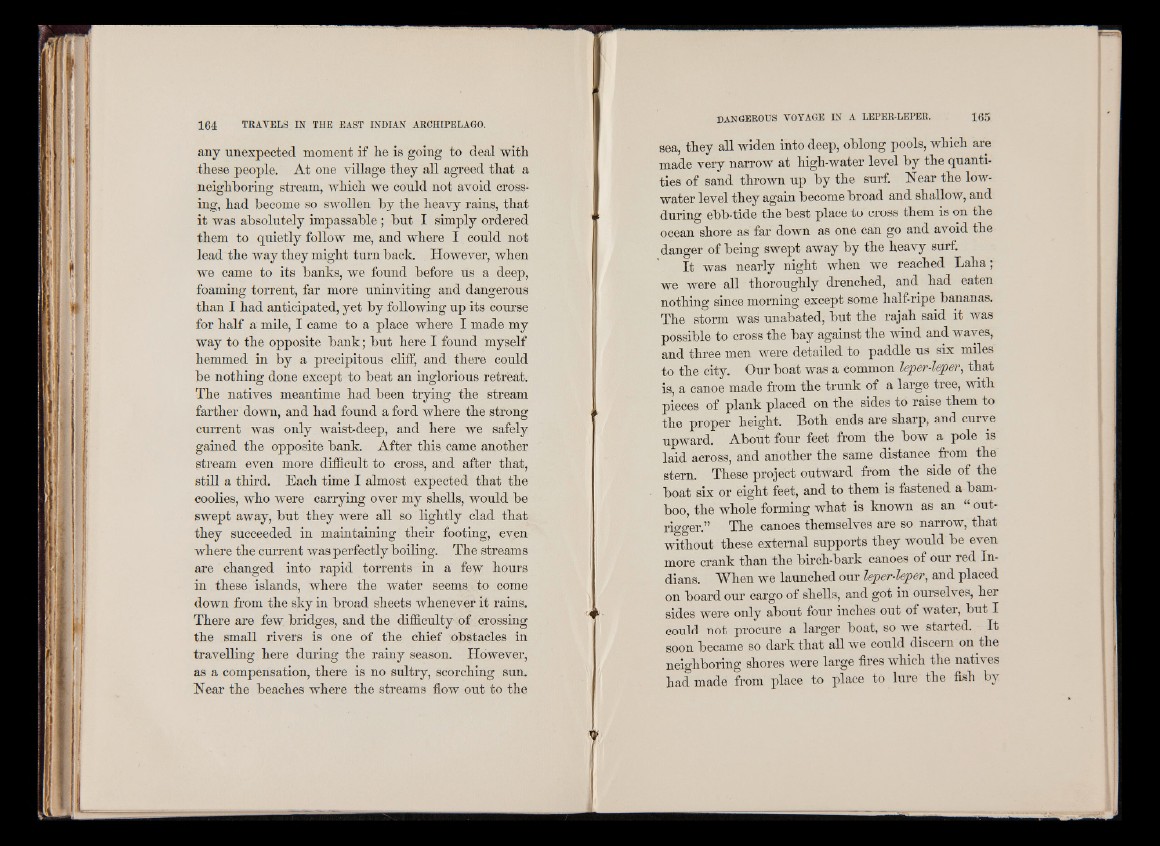
any unexpected moment if he is going to deal with
these people. At one village they all agreed that a
neighboring stream, which we could not avoid crossing,
had become so swollen by the heavy rains, that
it was absolutely impassable ; but I simply ordered
them to quietly follow me, and where I could not
lead the way they might turn back. However, when
we came to its banks, we found before us a deep,
foaming torrent, far more uninviting and dangerous
than I had anticipated, yet by following up its course
for half a mile, I came to a place where I made my
way to the opposite bank; but here I found myself
hemmed in by a precipitous cliff, and there could
be nothing done except to beat an inglorious retreat.
The natives meantime had been trying the stream
farther down, and had found a ford where the strong
current was only waist-deep, and here we safely
gained the opposite bank. After this came another
stream even more difficult to cross, and after that,
still a third. Each time I almost expected that the
coolies, who were carrying over my shells, would be
swept away, but they were all so lightly clad that
they succeeded in maintaining their footing, even
where the current was perfectly boiling. The streams
are changed into rapid torrents in a few hours
in these islands, where the water seems to come
down from the sky in broad sheets whenever it rains.
There are few bridges, and the difficulty of crossing
the small rivers is one of the chief obstacles in
travelling here during the rainy season. However,
as a compensation, there is no sultry, scorching sun.
Near the beaches where the streams flow out to the
sea, they all widen into deep, oblong pools, which are
made very narrow at high-water level by the quantities
of sand thrown up by the surf. Near the low-
water level they again become broad and shallow, and
during ebb-tide the best place to cross them is on the
ocean shore as far down as one can go and avoid the
danger of being swept away by the heavy surf.
It was nearly night when we reached Laha;
we were all thoroughly drenched, and had eaten
nothing since morning except some half-ripe bananas.
The storm was unabated, but the rajah said it was
possible to cross the bay against the wind and waves,
and three men were detailed to paddle us six miles
to the city. Our boat was a common leper-leper, that
is, a canoe made from the trunk of a large tree, with
pieces of plank placed on the sides to raise them to
the proper height. Both ends are sharp, and curve
upward. About four feet from the bow a pole is
laid across, and another the same distance from the
stern. These project outward from the side of the
boat six or eight feet, and to them is fastened a bamboo,
the whole forming what is known as an “ outrigger.”
The canoes themselves are so narrow, that
without these external supports they would be even
more crank than the birch-bark canoes of our red Indians.
When we launched our leper-leper, and placed
on board our cargo of shells, and got in ourselves, her
sides were only about four inches out of water, but I
could not procure a larger boat, so we started. It
soon became so dark that all we could discern on the
neighboring shores were large fires which the natives
had made from place to place to lure the fish by